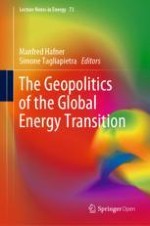Open Access 2020 | Open Access | Buch

The Geopolitics of the Global Energy Transition
herausgegeben von: Prof. Dr. Manfred Hafner, Dr. Simone Tagliapietra
Verlag: Springer International Publishing
Buchreihe : Lecture Notes in Energy
Open Access 2020 | Open Access | Buch

herausgegeben von: Prof. Dr. Manfred Hafner, Dr. Simone Tagliapietra
Verlag: Springer International Publishing
Buchreihe : Lecture Notes in Energy
The world is currently undergoing an historic energy transition, driven by increasingly stringent decarbonisation policies and rapid advances in low-carbon technologies. The large-scale shift to low-carbon energy is disrupting the global energy system, impacting whole economies, and changing the political dynamics within and between countries.
This open access book, written by leading energy scholars, examines the economic and geopolitical implications of the global energy transition, from both regional and thematic perspectives. The first part of the book addresses the geopolitical implications in the world’s main energy-producing and energy-consuming regions, while the second presents in-depth case studies on selected issues, ranging from the geopolitics of renewable energy, to the mineral foundations of the global energy transformation, to governance issues in connection with the changing global energy order. Given its scope, the book will appeal to researchers in energy, climate change and international relations, as well as to professionals working in the energy industry.